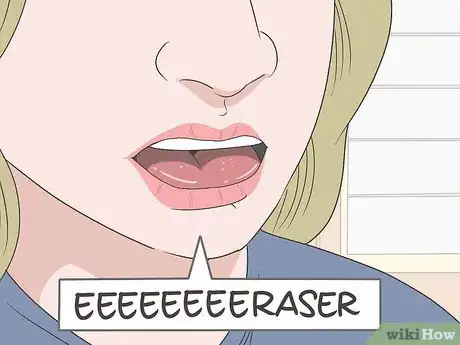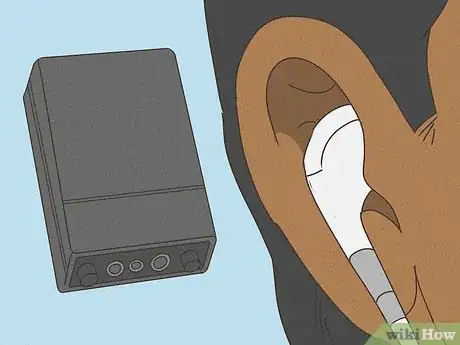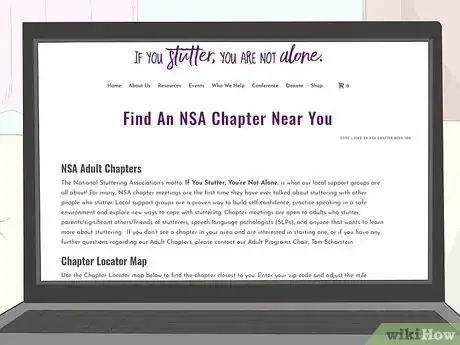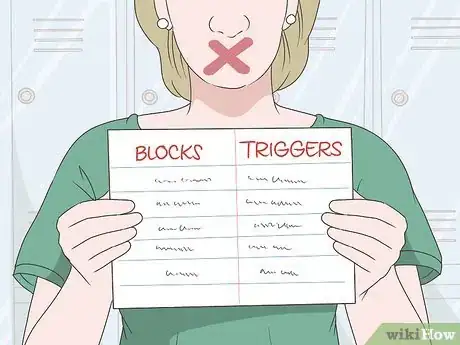This article was co-authored by Devin Fisher, CCC-SLP. Devin Fisher is a Speech-Language Pathologist based in Las Vegas, Nevada. Devin specializes in speech and language therapy for individuals with aphasia, swallowing, voice, articulation, phonological social-pragmatic, motor speech, and fluency disorders. Furthermore, Devin treats cognitive-communication impairment, language delay, and Parkinson's Disease. He holds a BS and MS in Speech-Language Pathology from Fontbonne University. Devin also runs a related website and blog that offers speech-language therapy resources and information for clinicians and clients.
There are 16 references cited in this article, which can be found at the bottom of the page.
wikiHow marks an article as reader-approved once it receives enough positive feedback. This article received 60 testimonials and 100% of readers who voted found it helpful, earning it our reader-approved status.
This article has been viewed 1,222,772 times.
Stuttering can be a frustrating condition that affects people of all ages, but thankfully, there are many ways to overcome it! Whether you stutter due to nerves or anxiety or have specific triggers that set it off, practicing speech exercises and seeking treatment will help you conquer your fears. Read on for a comprehensive guide to getting rid of a stutter, from easy tricks you can do by yourself to tips on helping a loved one manage their stutter.
Things You Should Know
- Practice regular speech exercises to help you talk. Use deep breathing, slow speech, and mindfulness meditation to remain calm while you speak.
- Pause between phrases and read out loud. Speak while exhaling to suppress your urge to stutter, and practice speaking in rhythm by reciting a song.
- Consider medical treatment, including a speech therapist and stuttering support groups, if your stutter lasts for several months.
Steps
Home Exercises to Stop the Stuttering
-
1Take a few deep breaths to clear your mind. Anxiety and nervousness can worsen your stuttering, so relax your body with a series of deep breathing exercises before speaking.[1] Sit (or lay down) in a comfortable position and close your eyes. Breathe in deeply through your nose, letting your abdomen fully expand. Pause for a second, then breathe out slowly through your mouth.
- Breathe deeply for a few minutes until you feel relaxed, and do breathing exercises regularly to reduce your anxiety.
- Becoming more relaxed can also boost your confidence, making speaking easier without stuttering.
-
2Speak slowly and deliberately to reduce your stuttering. If you tend to stutter while speaking quickly, do a series of drills where you speak a sentence slowly and deliberately, pausing in the middle of words as a reminder to take it easy. When you stumble on a word, stop and sound out the syllables, leaving a pause between each one.[2]
- Try a similar exercise called "prolongation," where you drag out the first syllable of each word. Speak smoothly and calmly, focusing on pronouncing every syllable clearly.
- Don't worry if you stutter during each exercise. The point isn't speaking flawlessly; it's learning to remain calm when you speak.
- When practicing these exercises around someone else, let them know what you're doing and explain that their patience would really help curb your anxiety.
Advertisement -
3Take long natural pauses between phrases while reading aloud. Pick up a book and read a few pages to yourself, leaving a long break between each phrase. Increase the pauses between every few words if your stutter starts to show. This exercise is designed to help you refocus when you get nervous and let moments of tension pass without disrupting your speech.[3]
- During each pause, take a moment to clear your head if your nerves are improving. Take a breath and think about what comes next before continuing.
- Start reading from a book you know well. Then, choose a book you haven't read before once you're comfortable. This allows you to practice reciting unexpected words.
-
4Practice mindfulness to lower your nervousness and anxiety. Mindfulness is a form of meditation that allows you to calm yourself and refocus your mind. Take a seat in a quiet spot and close your eyes. Pay attention to the sensation of your breathing and how it feels. If your mind wanders, calmly return your attention to breathing.[4]
- Mindful meditation helps to clear your thoughts; when you're done, you can focus fully on whatever speaking exercises you want to try.
- Be kind to yourself! It's okay if you have trouble paying attention at first. Don't get angry or frustrated; just refocus and keep trying.
-
5Speak while exhaling when your vocal cords are most relaxed. This exercise is simple! Start by inhaling through your nose. Take a deep breath, then exhale through your mouth, speaking a few words or phrases. The idea is that it's easier to suppress a stutter when speaking on an exhale because your vocal cords are relaxed, and the air is naturally leaving your body.[5]
- Practice this by yourself at first. Then, when you're comfortable with it, start doing this with friends or family at home.
-
6Practice speaking in a rhythm by reciting a song. Predictable rhythms can stop your brain from getting confused and stumbling over words, making speaking easier without stuttering. Try singing or chanting the words to a song you know by heart. Play the song at a lower volume so you can still hear yourself and see if your stutter improves.[6]
- This makes your practice sessions productive and fun!
- You could also tap your foot to the beat to feel the song's rhythm a little better.
-
7Practice speaking in a safe environment with a friend or family member. If your stutter is caused (or made worse) by nerves, the best way to ease yourself into public speaking is to work with someone you trust. Ask a close friend or family member if they'll sit with you and talk so you can practice your speech and run through a few exercises with them as your supportive audience.[7]
- If you're a little nervous and want to start slow, try practicing over the phone with someone. Phone calls are less intimidating because you're not face-to-face.
-
8Rehearse speeches beforehand and visualize a successful outcome. Plan out your presentation carefully if you're trying to master public speaking without stuttering. Rehearse what you'll say multiple times until you can run through the speech comfortably. As you practice, anticipate what the actual presentation will feel like and visualize yourself smoothly delivering each line.
- Focus on practicing your opening and closing statements; if you start strong, you're more likely to carry that confidence through the speech and end with a bang!
- Don't be afraid to slow down in the middle of a speech. When your mind and mouth are out of sync, it's easy to stumble over your words. Start speaking slowly and over-articulate each word to get back on track.
- Ask a friend to listen to you speak so you can practice with an audience, or take a video recording of the entire speech to analyze it and make changes when necessary.
-
9Record yourself speaking so you can track your progress. After recording yourself (either a simple voice recording or a video of yourself will work), listen to the recording and analyze it. Write down any words or phrases that trigger your stutter so you can practice using them more. Recordings will help you catch things you wouldn't have noticed otherwise and help you pinpoint what to work on next.[8]
- Analyze the recording with your friends and family as well. They may notice things about your speech pattern that you don't and help you address those issues.
- It's okay to start slow if the sound of your voice brings you anxiety. Try focusing on the positive side of things, and remember that you're making progress!
Treatment Options for Stuttering
-
1Consider speech therapy if your stutter lasts more than 6 months. You'll know it's time to see a therapist if you've worked diligently on your stutter, but it doesn't improve. Speech therapists can analyze the issue and provide treatment and professional advice on managing the condition. They'll coach you through helpful exercises that make speech feel easier and more natural.[9]
- Both children and adults can benefit from speech therapy!
- If you need help finding a speech therapist, the American Speech-Language-Hearing Association has a list of resources to help.
- Remember that speech therapy can be a long process. You may be working with your therapist for several months. Stay patient and follow the therapist's advice to ensure therapy is effective.
-
2Seek cognitive behavioral therapy if your stutter is psychological. This type of psychotherapy is designed to tackle the underlying issues causing your stutter. Stress, anxiety, and self-esteem issues can make a stutter worse, but a behavioral therapist will identify the source of the problem and teach you new ways of thinking that may improve the stutter.[10]
-
3Ask your doctor about medication in combination with therapy. No medication can directly cure a stutter. Still, if your stutter is caused by anxiety, a doctor may prescribe an anti-anxiety drug like Xanax or an antidepressant to help you manage your nerves while speaking. Medication alone won't fix the problem; speech or behavioral therapy and regular practice at home are still the best medicine.[11]
-
4Consult your doctor about electronic devices to improve your stutter. There are multiple varieties of devices designed to fit in your ear. Some provide delayed auditory feedback to help you slow down your speech, while others mimic your speech, so it sounds like you’re talking in unison with yourself. If you need extra help overcoming your stutter, one of these devices may work for you.[12]
- However, it’s important to note that many of these devices are still being researched and developed. While they may help you, more research is needed to determine their overall effectiveness.
- If your doctor feels a device may help, ask them (or a speech-language pathologist) to help choose the best one for you.
-
5Visit a stuttering support group for help and guidance. In a support group, you'll be able to learn from other people who face the same challenges as you. Plus, support groups can help you feel less alone. Stuttering is a common issue, affecting around 1% of the world's population (70 million people). Belonging to an active community can give you the confidence to overcome your stutter once and for all.[13]
- If you're in the United States, the National Stuttering Association has local support groups.
- In the UK, the British Stammering Association also hosts support groups.
- If you're in another country, look for local stuttering support groups online, and don't hesitate to ask someone for help in your search.
Supporting a Child or Loved One with a Stutter
-
1Get your child professional treatment with a speech therapist. Early support and treatment have been proven highly effective in preventing long-term stutters in children. Find a speech therapist for your child and be prepared to help them navigate practicing outside of therapy as well.[14]
- Check in with your child regularly. Ask them how they feel about the stutter and encourage them to express self-confidence, but switch to simple "yes" or "no" questions if you notice them struggle to speak.
-
2Teach children to speak more slowly by example. If your child needs help making changes to their speech patterns, model those changes for them by speaking at a slower rate and remaining physically relaxed. Insert pauses after every few words so your child can observe your behavior and imitate it, learning how to converse slowly and comfortably.[15]
- Ask your child's speech therapist if there are other specific techniques you can model for them at home. The therapist will likely have some helpful input!
-
3Be patient and let them speak at their own pace. When your child or loved one struggles to speak, it may undermine their confidence to interrupt, finish a sentence for them, or react impatiently. Let them complete their thought regardless of how long it takes. They'll feel more comfortable around you and less anxious because there's no rush to finish speaking.[16]
- Showing patience will help your child or loved one slow down, relax, and learn to speak without stuttering.
- Remember that this is a process, and they'll need your long-term support to make progress. Stay positive and offer praise to empower them as they learn to be calm and well-spoken despite the stutter.
Speaking in Public with a Stutter
-
1Acknowledge your stutter when talking to others. People who stutter sometimes feel shame and embarrassment, which leads them to hide it from others. But the truth is, there's nothing wrong with having a stutter (and sometimes, trying to conceal a stutter can make it worse). When you're speaking in public, confidently fill them in on your situation, because this can help you take control.[17]
- Simply say: “Please excuse me if I speak slowly, I have a stutter." Most people will be super accepting; if someone isn't, then that's on them, not you.
-
2Avoid your blocks and trigger words in conversation. You’ve probably identified the specific triggers and blocks that cause your stutter. And eventually, with time and practice, you'll be able to use them with ease. But while you're still getting your feet under you, it makes sense to avoid using triggers and blocks in public conversation (that way, you limit the risk of your stutter popping up).[18]
- Make a list of synonyms for your trigger words. There are probably tons of words out there that you can use instead, so grab a thesaurus and familiarize yourself with them. For instance, if a word like "comfortable" is a trigger, you can swap it with "cozy."
-
3Maintain eye contact when you speak to others in public. Though stuttering might throw your confidence momentarily, it really shouldn't. You deserve to feel in control while you speak to others, and you know what they say: fake it till you make it. By maintaining strong eye contact, you're signaling to others (and more importantly, yourself) that nothing's wrong and you're in the driver's seat.[19]
- This'll boost your confidence over time, which will reduce your stutter, too.
-
4Make hand motions while you chat with other people. Stuttering is sometimes the result of nervous energy that your body doesn’t know what to do with. That's where hand gestures come in! Think of gesticulations like an extra outlet for that nervous energy. Instead of stuttering, your channel it straight into your arms and hands.[20]
- This technique is especially useful if you give a public presentation. When planning your speech, also plan out some hand motions that help reduce your stutter. Note down on your script where you’ll use these hand motions.
-
5Start conversations with random people, even when it's hard. This is a great way to get a sense of how much you've improved. By having a random, unplanned conversation with a stranger, you'll be able to flex your new skills. Plus, the more you practice, the more comfortable you'll get holding conversation without stuttering.[21]
- Begin a conversation by introducing yourself and saying, “I stutter and I’m working to improve my speech.” You will probably find many people who are eager to help you.
- Asking people for directions is a good, fast exercise. Even if you know the way, this allows you to interact with people without asking them to engage in a full conversation.
Expert Q&A
Did you know you can get expert answers for this article?
Unlock expert answers by supporting wikiHow
-
QuestionHow can I help someone who has a stutter?
 Devin Fisher, CCC-SLPDevin Fisher is a Speech-Language Pathologist based in Las Vegas, Nevada. Devin specializes in speech and language therapy for individuals with aphasia, swallowing, voice, articulation, phonological social-pragmatic, motor speech, and fluency disorders. Furthermore, Devin treats cognitive-communication impairment, language delay, and Parkinson's Disease. He holds a BS and MS in Speech-Language Pathology from Fontbonne University. Devin also runs a related website and blog that offers speech-language therapy resources and information for clinicians and clients.
Devin Fisher, CCC-SLPDevin Fisher is a Speech-Language Pathologist based in Las Vegas, Nevada. Devin specializes in speech and language therapy for individuals with aphasia, swallowing, voice, articulation, phonological social-pragmatic, motor speech, and fluency disorders. Furthermore, Devin treats cognitive-communication impairment, language delay, and Parkinson's Disease. He holds a BS and MS in Speech-Language Pathology from Fontbonne University. Devin also runs a related website and blog that offers speech-language therapy resources and information for clinicians and clients.
Speech Language Pathologist One important thing is that you want to avoid any casting of judgment on their stuttering because that can really increase their avoidance of communication. You've also got to let the person do what they're comfortable with and what they prefer when communicating. Some people might want help getting their message across to others while some people will want to do it on their own and work through it.
One important thing is that you want to avoid any casting of judgment on their stuttering because that can really increase their avoidance of communication. You've also got to let the person do what they're comfortable with and what they prefer when communicating. Some people might want help getting their message across to others while some people will want to do it on their own and work through it.
References
- ↑ Patrick Muñoz. Voice & Speech Coach. Expert Interview. 12 November 2019.
- ↑ https://healthfully.com/exercises-for-stuttering-6953597.html
- ↑ https://www.stutteringhelp.org/sites/default/files/Migrate/book0012_11th_ed.pdf
- ↑ https://www.mindful.org/how-to-practice-mindfulness/
- ↑ https://youtu.be/F6tEygVuy1Y?t=185
- ↑ https://www.stutteringhelp.org/content/singing-and-stuttering-what-we-know-0
- ↑ https://www.stutteringhelp.org/sites/default/files/Migrate/book0012_11th_ed.pdf
- ↑ https://www.stutteringhelp.org/sites/default/files/Migrate/book0012_11th_ed.pdf
- ↑ https://www.asha.org/public/speech/disorders/stuttering/
- ↑ https://www.ncbi.nlm.nih.gov/pmc/articles/PMC6929220/
- ↑ https://www.stutteringhelp.org/alprazolam-citalopram-and-clomipramine-stuttering
- ↑ https://www.stutteringhelp.org/electronic-devices-software-and-apps
- ↑ https://www.stutteringhelp.org/faq
- ↑ https://www.stlouischildrens.org/conditions-treatments/stuttering
- ↑ https://www.stlouischildrens.org/conditions-treatments/stuttering
- ↑ https://www.stlouischildrens.org/conditions-treatments/stuttering
- ↑ https://www.stutteringhelp.org/managing-your-stuttering-versus-your-stuttering-managing-you
- ↑ https://www.medicalnewstoday.com/articles/321995.php
- ↑ https://www.stutteringhelp.org/sites/default/files/Migrate/book0012_11th_ed.pdf
- ↑ https://www.medicalnewstoday.com/articles/321995.php
- ↑ https://www.stutteringhelp.org/managing-your-stuttering-versus-your-stuttering-managing-you
About This Article
To stop stuttering, practice your speaking skills by talking to yourself in the mirror, and make an effort to slow down and relax while you talk. As you become more confident in your skills, move on to reading books and speeches out loud. When you do stutter, it can be helpful to make a guttural noise like “blah” or “grr” to relieve tension, and then start the sentence over again. If you continue to struggle with stuttering, consider visiting a speech therapist. For more tips, including how to help a stuttering child, scroll down!






























-Step-17-Version-2.webp)
























































Medical Disclaimer
The content of this article is not intended to be a substitute for professional medical advice, examination, diagnosis, or treatment. You should always contact your doctor or other qualified healthcare professional before starting, changing, or stopping any kind of health treatment.
Read More...